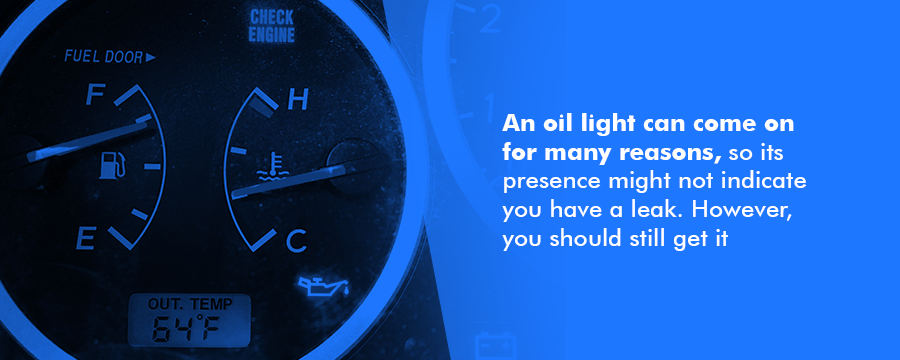
How to Find an Oil Leak in a Classic Car? | Troubleshooting
Oil leaks in any car can be a common issue, and if it is significant, you should get it taken care of immediately. For classic cars, minor oil leaks are practically standard, and owners should not worry too much about them. However, if these minor oil leaks begin to turn into major ones, losing substantial amounts of oil, you'll need to take action.
Major oil leaks can damage other parts of your vehicle and harm the integrity of your engine. Since you've made a significant investment into your vehicle, you probably don't want something like a significant oil leak to harm it.

How Can I Tell If I Have an Oil Leak?
You'll need to be able to tell the signs your car is leaking oil if you want to protect it against damage. Below are some of the common symptoms of an oil leak.
1. Finding Dark Puddles Underneath a Vehicle
Whenever you back out of your parking space at work or driveway, look to see if you are leaving behind a yellow or dark brown puddle. If you find a substantial one, you may want to examine your vehicle for the source of the leakage. This sort of leak might indicate that the oil pan is leaking. An untreated oil pan leak will cause your car to begin having problems with oil levels and pressure.
2. Engine Smoke
Smoke coming from your engine could be a result of oil dripping onto the exhaust manifold. You won't want to go too long without having this fixed, as the oil has a high chance of making gaskets break or damaging the oxygen sensors.
3. Dashboard Oil Light Being On
An oil light can come on for many reasons, so its presence might not indicate you have a leak. However, you should still get it inspected. The light is a warning that your oil level or pressure is too low, so you should take it seriously. If you see it's on, you should start oil leak troubleshooting by checking for other symptoms and looking under your car for any damaged material.

4. Burning Oil Smell
If there's an odd, thick smell coming out of your car, with the sound of sizzling coming from under the hood, there's a good chance you have an oil leak. The smell will come from the oil dripping onto the engine's hot metal.
5. Overheated Engine
Your engine oil plays a vital role in keeping your engine's temperature at appropriate levels. As the pistons glide together within their house, the oil lubricates them so they move smoothly. Without enough oil, the pistons will end up grinding against other sections of the engine. This grinding then produces heat and, in the worst-case scenario, your engine can seize up and stall. If your engine is overheating, get it examined immediately to make sure your engine doesn't seize up entirely.
6. Dipstick Check
If you suspect an oil leak, you can start checking your dipsticks regularly. If you can see the oil is consistently dropping, there's a good chance your oil is leaking.
What Should I Do If My Car Is Leaking Oil?
As many classic car owners know, older cars are going to leak oil. Due to the technology of yesteryear, oil leaks are standard for most old cars and should not be a huge concern for drivers. For example, gaskets and seals will dry up on a car you don't regularly drive, and the minor leaks that occur from this will not represent a threat to your car's health.
Since leaks are par for the course, many savvy older car owners know that they shouldn't be too concerned when they see minor leaks occurring. However, if the leak is substantial, you will want to repair it as soon as possible to avoid any extra damage that can result from excessive leakage.
To determine if you should try to repair it yourself or if you need to take it to the mechanic, you should check to see how severe the leak is and if you have any substantial damage that's causing it. A major leak will likely require you to have your car bedded and taken to the mechanic. If it's a minor leak, you may be able to drive it to the mechanic after topping off the fluids, or you may want to repair it yourself.
If you suspect a major leak, you should follow the steps below to figure out how to find where the leak is and how to repair the car.
1. What Causes an Oil Leak?

If you've always taken good care of your car and its maintenance needs, you may be wondering, "Why is my car leaking oil?" Most leaks are a result of engine gaskets having degraded, broken oil seals, bad connections or oil pan leaks. To begin a repair, you'll need to find the culprit by crawling under the car and checking a few of these issues.
- Oil filter: Since all the engine's oil passes through the oil filter continually, you'll need to check the filter attachment. Knowing how to find the source of an oil leak might begin with a loose filter.
- Oil drain plug: You can find your oil drain plug screwed into the bottom of your engine's oil pan. Typically, you'd use this to let the old oil drain out before you pour in any new oil. Check to see if the oil drain plug has become worn or misaligned, along with checking to see if it's too loose or overly tight. Besides the other checks, you'll need to look at the plug's sealing ring to see if it's on tight.
- Oil pan and gasket: Due to the oil pan's location at the bottom of your engine, it will be at risk of damage from debris on the road. A hole in the oil pan will cause leakage. Along with checking for a hole in the oil pan, you'll want to examine the pan's gasket for signs of damage and wear. If it has worn out, you may have found your culprit.
- Oil filler cap: You can find this cap at the top of your engine. It will be large, round and removable, and it will often have an oil can symbol on its outside. When you look at the cap, see if the seal is worn or if the cap is loose or missing. If you notice one of these issues, it could be creating pressure while the engine runs that can cause an oil leak.
- Oil cooler lines: If your vehicle has an external oil cooler, you'll need to check the lines for damage or corrosion. The purpose of an oil cooler is to cool the oil down as it passes through the lines and the cooler before it returns to the engine. If there's damage to the lines where oil passes through, there's a good chance it's the source of your leak.
- Valve cover gaskets: The valve covers protect the valve assemblies and keep the oil inside the valve assembly where it circulates. You'll find the gaskets between the cylinder head and valve cover. It the gasket corrodes or deteriorates, a leak can occur.
- Additional gaskets and seals: Along with valve cover gaskets, you'll want to check other gaskets found on your engine, such as head gaskets and the timing belt cover gasket. Additionally, you can check the rear main seal around the crankshaft, along with the camshaft seals, to look for leaks.
- Lack of oil changes: If you don't change your oil at the recommended intervals, you'll want to start doing so. Oil that does not get changed regularly will produce corrosive substances and sludge, along with taking on several damaging elements. As the oil continues to deteriorate, it can cause issues throughout the engine.
2. Making the Repairs
If you find a problem in any of the above areas, you may be able to handle these repairs yourself. As a classic car owner, you won't have to worry about someone else tinkering with your prized possession, and you can attempt to fix the oil leak yourself.
How long does it take to fix an oil leak? The answer to that, again, depends on the severity of the issue. If you find there's a problem with your oil filler cap, you can sometimes tighten it, but if there's something broken, you will need to replace the cap and reinstall it. For oil filter leaks, you can tighten or remove the filter before reinstalling a new one. To ensure you have resolved the problem, clean the area and then check to see if the leak is continuing.
With a valve cover leak, you can occasionally fix the valve covers by tightening leaks that have loosened. However, if you find the valve is still tight, you'll need to replace the valve cover gasket entirely. For a front crankshaft main seal leak, you'll need to replace the front crankshaft for the repair. A rear crankshaft seal is similar in function to the front crankshaft, but it is more difficult to replace, since you'll need to remove the transmission first.
A timing cover gasket leak will require repairs by replacing the gasket, along with the front main seal. For an oil pan leak, you'll want to remove the damaged pan and replace it and the gasket.
Can You Drive a Car With an Oil Leak?
Since oil plays an essential part in lubricating your engine, a major leak can put your car at risk if you drive it. However, a minor leak is standard for classic cars, and you shouldn't feel concerned about driving it.

When you take your car to a show or drive it around town, you want it to be running in top condition. If you have a major leak, it can end up harming your car's performance, which then takes away from the investment you've made in it. To protect the car's value and yourself, whenever your car has a major leak, you should have the car bedded and taken to your local mechanic.
How Much Does It Cost to Fix an Oil Leak?
As a substantial oil leak can be destructive to your engine and other components of your car, it is almost always worth it to pay for repairs. The cost to repair an oil leak can range from being reasonably inexpensive to costly, depending on how long the leak has been occurring and how bad the damage is. Your final price tag can range from around $100 to over $1,000, so you'll want to catch oil leaks early.
Generally, the costs will be higher if the repair technician has to remove the engine or transmission components to fix the issue. You should also note that, since cars have different designs, a straightforward repair for one might be more difficult for another, leading to higher upgrade costs. For a classic car, in particular, it may be more challenging to find specifically designed replacement parts and repair tools for it. If you own one of these autos, do your research on what your car needs.
As the increased costs for having to remove the engine indicate, the repair cost is often going to depend on the source of the oil leak. For easy-to-reach places, you may have all the tools you need to make the repairs yourself, thus cutting down on labor costs. Additionally, common parts like gaskets and oil seals are generally relatively inexpensive, only costing somewhere between $5 and $30.
For repairs that only need a gasket or seal replaced, the majority of the cost will come from the labor if you take it into a shop. If you trust yourself to make the repair, you could save a good deal of money. Even with the labor cost, this sort of easy gasket replacement repair will be on the lower end.
You'll get to the higher end of the costs when you need to remove parts of the vehicle to get to the spot where the leak is coming from. Having to replace a camshaft seal, for example, can be on the higher end of the cost spectrum, as the repair tech will need to remove the timing belt and parts of the engine to get to it.
Engine Failure
Underscoring the need to take care of substantial oil leaks as soon as they show up, if your engine seizes up or catches on fire, you will be looking at much higher repair costs. Replacing or rebuilding an engine can cost $3,000 and up, more than doubling the cost of even the most expensive oil leak repair job. If your classic car has an engine that is challenging to replace, it may cost even more money and time to get the vehicle running again.
An engine can seize up in the middle of traffic, causing your car to stop running. An incident like this could cause an accident, especially if you're on a crowded highway, or it could leave you stranded far from home.
If the engine is rare and you need it rebuilt rather than replaced, some mechanics will be able to do it, but the costs will be much higher. It's better to be proactive by changing your oil at the recommended times and repairing any major leaks as soon as they occur.
View Other Guides on Muscle Cars:
Find Quality Cars and Expert Advice From Volo Museum Auto Sales
If you love classic cars, you'll feel right at home at Volo Museum Auto Sales. We have an extensive inventory of classic cars that are sure to impress. Along with buying and selling classic cars, we also have a museum where you can take the whole family for a fun day.
Our dedication to vintage cars knows no bounds, and we want to share our knowledge with you. If you see any vehicles you're interested in or want more information on a car, a member of our staff will be happy to speak to you.



